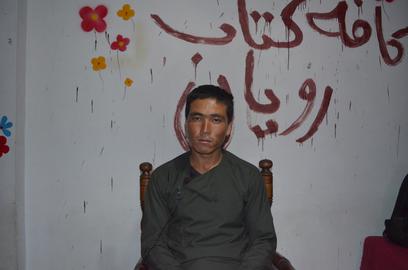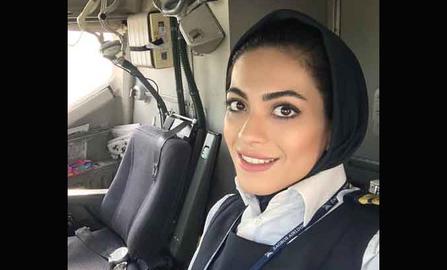In Kerman, a city in southeast Iran, Iranian police routinely arrest Afghan migrants. Often, they beat them badly and then they transport them to a camp for three days before deporting them back to Afghanistan. Mohammadyar, from a small remote city in Bamyan province, is one of many migrants who has experienced this. He dropped out of school at age 14 due to poverty. Twice he has fled to Iran illegally in the hopes of earning money.
He talks about his first attempt to get to Tehran. At night, Afghan smugglers drove him and others in Toyota vans to Iran via Pakistan. But Taliban forces intercepted them and blocked them from crossing the border, so they drove back to Nimruz, a province in southwestern Afghanistan.
Sometime later, Mohammadyar took the same route again, as he had heard that the Pakistan borders were now open. He and his friends found an Afghan smuggler who promised to take them to Tehran for 1.5 million tomans (about US$356). “We called the smuggler, who was in Kabul, to come to Nimruz,” Mohammadyar said. “He came and took us to his guesthouse. We ate dinner there and he gave us a little cash and said not to sleep tonight since we will leave in the middle of the night,” Mohammadyar said.
They loaded the Toyota van with Mohammadyar and 34 other travelers and drove to Pakistan. Mohammadyar was told to bring some water and bread along for the journey. But water, bread, a few items of clothing and a few personal items for each passenger meant the space was limited and the van was cramped. “As we arrived to the Pakistan borders, the Pakistani traffickers came and picked us up,” Mohammadyar said. “We crossed the borders and stayed on a playing field for a day and a night. The traffickers brought us water and bread and cookies from shops in the vicinity, which were quite expensive. People had no other choice than to pay those prices.”
During the night, the Pakistani traffickers took them toward Iran, using a route known as the “Raja” route — a safer way to travel compared with what traffickers refer to as the “hard mountain.” It’s the easiest route for families and children, and for people who can’t walk or climb long or difficult terrains. And usually, traffickers ask passengers for more money to use the Raja route.
Mohammdyar said that some families who had passed through the Iranian borders earlier and were then deported back to Afghanistan joined them, trying one more time. “We walked for 15 hours to reach the Iranian border. We were between 300 and 350 people, and some of us had already tried to pass the Iranian borders several times. Some people had no more money, and had to sell their cellphones to traffickers in order to buy some water and bread.”
After arriving in Iranian territory, the Pakistani traffickers handed the group over to Iranian traffickers. “Some Peugeot sedans were waiting for us; 16 of us were to get in each car,” Mohammdyar said, adding that the traffickers used abusive and aggressive behavior toward them. “They handle Afghan passengers in a very degrading [manner],” he said. “Afghans had to listen to whatever traffickers tell them on the road — otherwise they beat them up badly.”
Then the traffickers took them to a building site somewhere between the small cities of Khash and Saravan in the province of Sistan and Baluchistan in southeastern Iran, “The traffickers dropped us off and told us to stay there in an abandoned construction site. They said they would pick us up in half an hour; we sat there from 10am to 4pm and nobody showed up. Two thieves arrived with huge knives and took whatever they found from us. They were in the same team as the traffickers.”
Arrival in Tehran — But More Journeys to Come
Mohammadyar then traveled with a family, and they arrived in Tehran after a week. Again, the traffickers took them through easier and safer routes, where less walking is required. They brought them to a guesthouse and then asked to be paid electronically before they would let them go. Mohammadyar’s friend paid for him, and then he was free.
He worked for two years as a construction worker. But since he had no residential papers, he was arrested and deported back to Afghanistan, where he stayed for a few months before trying to escape to Iran again. As with the first time, he went to Nimruz to find an Afghan trafficker heading to Iran. They drove him in a Toyota first to Pakistan and then again they passed through to Iranian territory.
This time, the abuse from traffickers was more pronounced — probably because he was not traveling with a family now — and there was a lack of water and food. He and his fellow travelers had to walk for longer this time, since they were no longer with a family. From Khash, they again drove a Toyota van to Kerman. There were almost 40 people in every car. On the way, they had to change cars, and people were crammed into smaller Peugeots. After they passed the police station in Kerman and before they arrived in Tehran, the police stopped them on the road.
“It was midnight,” Mohammadyar told me. “They got us out of the car close to a police station. We walked until dawn. Three Baluchi traffickers escorted us. They separated us in smaller groups and told us to walk on the main road; cars were supposed to be waiting for us — 15 of us in each car. As we arrived at the main road at dawn, police cars spotted us and shot a few bullets in the air. We were 400 people, all running away. Some were able to escape; I was arrested and beaten badly. Then they took us to a camp for three days and deported us back to Afghanistan,” he said.
That was Mohammadyar’s last attempt to make his way to Iran. It remains to be seen whether he will attempt it again, and whether it is worth the risk.
visit the accountability section
In this section of Iran Wire, you can contact the officials and launch your campaign for various problems



























comments